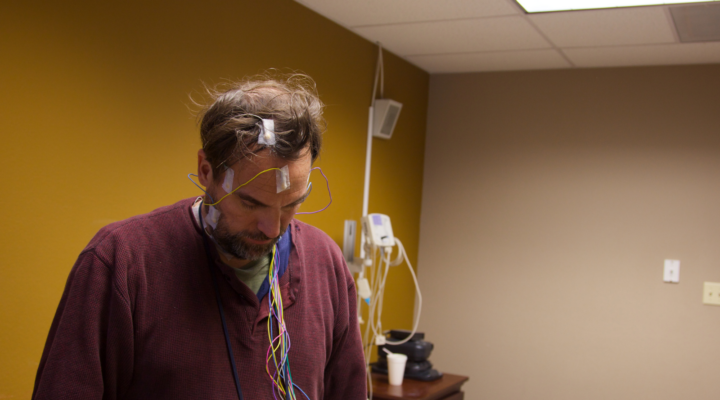

#TripleGivingTuesday news:
New Study Underway!
Sleep Disturbances in ME/CFS

From the desk of Ronald Tompkins, MD, ScD
Director, ME/CFS Harvard Collaboration
Chief Medical Officer, Open Medicine Foundation
To kick off the second week of Triple Giving Tuesday, Open Medicine Foundation (OMF) is thrilled to announce that we are funding a new collaborative research project! Conducted across the OMF Collaborative Network, this research initiative will investigate sleep disturbances in ME/CFS.
Sleep Disturbances in ME/CFS
Study duration: 18 months
Conducted at The Harvard ME/CFS Collaboration at the Harvard Affiliated Hospitals

About the Study
One required symptom for diagnosing ME/CFS is non-restorative sleep, that is, waking up feeling exhausted after a full night of sleep. This might suggest that sleep dysfunction could be involved in the ME/CFS disease process. New, more refined tools, such as high frequency recordings of an electroencephalogram (EEG), a test that detects electrical activity in the brain, could potentially uncover significant sleep dysfunctions in ME/CFS.
It is possible that inflammation of the Central Nervous System (CNS) plays a role in the symptom of unrefreshing sleep. Direct evidence for CNS inflammation in ME/CFS was revealed in a 2014 report, which demonstrates that microglial activation is one of the main cell types involved in neuroinflammation. This activation was seen in the thalamus (structure in the center of the brain) in nine ME/CFS patients.
Despite the fact that ME/CFS includes symptoms of profound fatigue and cognitive dysfunction or “brain fog”, no CNS biomarker, sleeping or brain biomarker have been identified to date.
Methods
The study will examine EEG frequencies (electrical activity occurring in the brain) of sleep and wakefulness in ME/CFS patients. Concurrently, Dr. Jonas Bergquist will evaluate cerebrospinal fluid proteomics at the Uppsala Collaborative Research Center. Dr Bergquist hopes to identify orexin (a neuropeptide that regulates arousal, and wakefulness) and related proteomic inflammatory markers in patients who have developed ME/CFS.
What does this study mean for ME/CFS patients?
This project will help us better understand how to eventually treat devastating sleep deficiencies and fragmentation that is associated with ME/CFS.
reveal disease-specific markers and reduce the influence of other factors like current medication, illness duration, age, sex and even the presence of certain comorbidities. Secondly, our method is portable, and cost-effective. It can allow the testing of individuals severely affected (e.g., housebound) who rarely participate in clinical studies.
This study will examine the same plasma samples using multiple technologies, in partnership with OMF Collaborative ME/CFS Research Centers at Melbourne, Uppsala and Montreal. Ultimately, this initiative aims to reveal disease-specific markers, better understand the molecular mechanisms underlying ME/CFS pathophysiology and discover treatment and intervention strategies.
I am very encouraged by the potential opportunity this study has to change the lives of people with ME/CFS around the globe! Please join OMF on our mission to end the suffering experienced by millions. When you donate today, you help ensure that our team has the resources necessary to fulfill this project’s promise — along with many others — to advance the clinical care of people with multisystem chronic, complex diseases.
